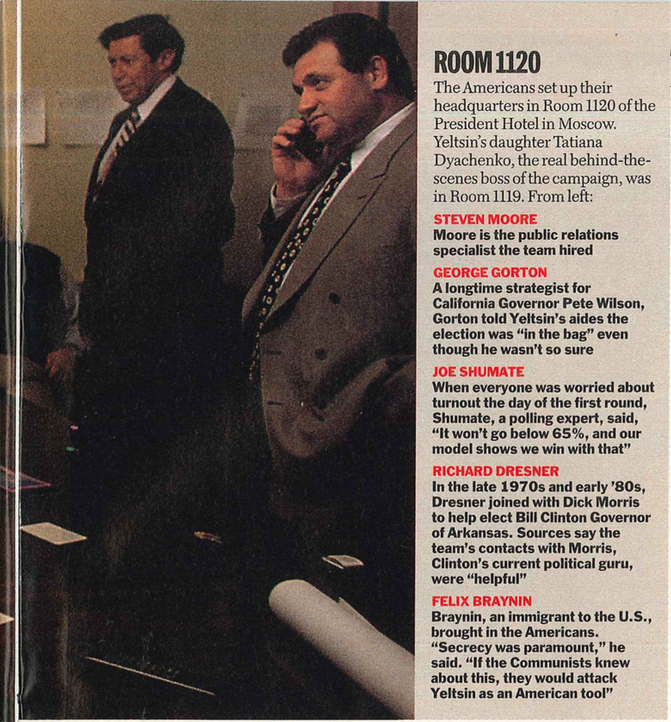“Yanks to the rescue”: Time’s not-so secret story of how Americans helped Yeltsin win 1996 presidential election
Catte Black
Imagine Izvestia ran a headline in January 2018 titled “Rescuing Donald”, in which it proudly boasted that a group of crack Russian election-fixers had been sent over to Washington to make sure Trump beat Hillary. Does anyone imagine it would stop short of impeachment for Trump and maybe even hot war with Russia? Yet 22 years ago Time magazine ran just such a feature on how four Americans and an ex-pat Russian had managed the 1996 Russian presidential election to ensure a win for Boris Yeltsin. And apparently that was something to openly boast about.

The cover of Time July 15 1996
On July 15 1996 Time magazine ran a screaming front page that read “Yanks to the Rescue – the secret story of how American advisers helped Yeltsin win.”
The exclusive feature inside left little room for doubt. It was headlined in red “Rescuing Boris” and the caption on the header photo of a smiling Yeltsin was:
The secret story of how four US advisors used polls, focus groups, negative ads and all the other techniques of American campaigning to help Boris Yeltsin win
while the standfirst continued the exultant theme (our emphasis):
In the end the Russian people chose – and chose decisively – to reject the past. Voting in the final round of the presidential election last week, they preferred Boris Yeltsin to his communist rival Gennadi Zyuganov by a margin of 13 percentage points. He is far from the ideal democrat or reformer, and his lieutenants Victor Chenomyrdin and Alexander Lebed are already squabbling over power, but Yeltsin is arguably the best hope Russia has for moving toward pluralism and an open economy. By re-electing him, the Russians defied predictions that they might willingly resubmit themselves to communist rule.
The outcome was by no means inevitable. Last winter Yeltsin’s approval ratings were in the single digits. There are many reasons for his change in fortune, but a crucial one has remained a secret. For four months, a group of American political consultants clandestinely participated in guiding Yeltsin’s campaign, here is the inside story of how these advisors helped Yeltsin achieves the victory that would keep reform in Russia alive.

The article went on to explain that Yeltsin was deeply unpopular at that time in Russia, polling no more than 8% and widely blamed for the rise of the gangster oligarchs, the collapse of infrastructure and the looting of Russia’s once state-owned natural resources. The Communists were resurgent, taking a lot of new seats in the elections to the Duma in the winter of ’95-6.
The Communist presidential candidate, Gennadi Zyuganov, was poised to ride this wave. If left to their own devices, Time says, the Russians could easily have voted a Red back into the Kremlin.
Obviously this could not be permitted to happen.
Time tells us America needed to keep the Communists out because of the need to maintain Russia on track with “reform.” But from our vantage point we now know that “reform” didn’t mean political reform. In fact the US was more than happy to ignore Yeltsin’s numerous unconstitutional incursions for as long as he was doing their bidding.
What Time means by “reform” is the vastly illegal and ethically barbarous looting of the Russian state and its people that was then being systematically perpetrated by the US, its financial institutions and its own gangster capitalists.
A Communist, or even a moderate nationalist, could be a disaster for this lucrative open conduit of virtually free raw materials and knock-down block shares in oil and gas production (and that’s not even getting into the questions of PNAC and the neocon drive to see Russia perennially divided and weakened, if not actually partitioned).
For all these reasons, broadly encompassed under the weasel word “reform”, the US did not want anyone but Yeltsin in the Kremlin in 1996. So, says Time, the Yanks decided to step in and fix things.
They sent over a team of five election-managers and image-makers to try to turn Yeltsin’s fortunes around. The men were old hands at this business. Richard Dresner had helped Bill Clinton get elected as governor or Arkansas. George Gorton was a “longtime strategist” for California governor Pete Wilson. Joe Shumate was a “polling expert” and another of Bill Clinton’s election team. Steven More was a PR specialist. Felix Braynin was a Russian ex-patriot who didn’t trust Communists.
They knew from the off their job wasn’t going to be easy. Because for the Russian people Boris Nikolayevich was one step up from poison. 60% of the population thought Yeltsin was corrupt. 65% thought he had wrecked the economy. In 1996 Stalin was getting more positive approval ratings than Yeltsin. An “early memo” from the group dated March 2 and cited by Time says:
Voters don’t approve of the job Yeltsin is doing, don’t think things will ever get any better and prefer the Communists’ approach.
They were similarly frank about the solution:
There exists only one very simple strategy for winning: first, becoming the only alternative to the Communists; and the second, making the people see that the Communists must be stopped at all costs.”
So, the five Americans got to work trying to secure the Russian election for their candidate of choice. They ran ad campaigns to promote the (bogus) idea of Yeltsin’s popularity. They ran other ads denigrating the opposition. They fixed his suits and sprayed his hair.

Time’s graphic showing the five “yanks” who came to Boris Yeltsin’s rescue in 1996 and helped secure him the presidency of Russia
They Americanised the process as much as they could – but not as much as they wanted to. A plan they conceived of Yeltsin entering a conference hall “through a boisterous crowd that would mob him” and delivering a short 15-minute speech “that television viewers might actually sit through” was rejected out of hand. Yeltsin decided instead to enter the hall in the normal Russian way to polite claps from men in suits, and he delivered an hour-long speech that probably made his American handlers groan in despair.
They made sure this rebellion wouldn’t happen again by using a “perception analyser” to show Yeltsin’s handlers what a turn-off his performance had been. From then on the Yanks seem to have had things their way, or so Time implies. They proceeded to look into the Russian people’s deepest fears and see how they could be used advantageously:
Having helped establish the campaign’s major theme, the Americans then set out to modify it. The Americans used their focus group co-ordinator, Alexei Levinson, to determine what exactly Russians most feared about the Communists. Long lines, scarce food and re-nationalisation of property were frequently cited, but mostly people worried about civil war.
Fear was the key. And Russia in the 1990s was a fearful place. All they had to do was convince enough people the Communists were more frightening than the gangsters currently running the show.
‘Stick with Yeltsin and at least you’ll have calm’ – that was the line we wanted to convey
And it worked. Or something did. Whether by dint of hairspray, focus groups, fear porn or something else undeclared, Yeltsin leapt from 2-8% popular support to 54.4% by the end of the campaign.
And he won. And Russia was saved.
Well, it was saved for the United States, its financial institutions and gangster capitalists anyway. But that’s another story.
You can download the entire article as a PDF here. You need to read it all to get the full flavour. And just to show how proud America was of interfering in this election, there was even a Hollywood movie made about it in 2003 called Spinning Boris.
[UPDATE: have now watched that film – it adds mind-blowing levels of racism and racial stereotyping to the mix to complement the laugh-along celebration of defrauding a sovereign nation and its people. Enjoy.]
After you have taken a look at all this, consider the following question:
What’s worse?
1) The triumphal bragging about manipulating the election to make sure their man became president in order to continue defrauding and dispossessing and even starving ordinary Russian people, or
2) The insane hypocrisy of – 22 years later – indicting 13 Russians for doing at worst a fragment and shadow of this colossal crime?
History will have a tough time deciding won’t it.
SUPPORT OFFGUARDIAN
If you enjoy OffG's content, please help us make our monthly fund-raising goal and keep the site alive.
For other ways to donate, including direct-transfer bank details click HERE.





It is amusing to me to see the legions of Trump supporters rallying around this article as though it doesn’t also tell the tale of how Putin, an intelligent man who is capable of learning from history, managed to do the same to the USA and put into power an incompetent president who is focused on destroying American institutions and propping up Putin and other dictators.
Bravo, Victor. Bravo.
And it turns out all they did was spend $150,000 on a few Facebook ads. Funny how many Democrats still believe Russia actually changed votes. $30 Million and 4 years and all we found out was the destruction of our Democracy by the Obama/Biden administration by spying on and obstructing a duly elected President.
I notice TweedleDum and TweedleDee, namely the ‘left of centre’ Guardian and Independent both today published heartrendering stories about more massacres of innocents around Damascus by Assad and Russia in Syria. Of course, barrel bombs, the heroic White Helmets and Syrian Observer in Coventry get mentioned. Remarkably, the Guardian version is posted from Beirut, the Independent one from Istanbul. Neither cities are within eyesight of Damascus, even with the most powerful binoculars. Who needs journalistic standards of fact finding and truth seeking these days in the MSM?
The copy was fact-checked by the Guardian’s digital culture hack, sorry, I meant Middle Eastern correspondent, Olivia Solon from her base in San Francisco – apparently it all checks out, and can in no way be construed as an apologia for ratcheting up yet more anti-Russian sentiments.
Its only a matter of time before the US start ‘helping’ the citizens of Venezuela in order to safeguard them from their elective representatives.
“yet more anti-Russian sentiments” You say this as if Russia is the the enemy of the USA and all of the former USSR states what it wishes it still controlled.
*as if Russia *isn’t*
My apologies for the typo.
Don’t you think you have quite a lot more than a typo to apologise for?
Consider commenting on subjects you actually understand, if any.
Notice, too, how these Evil lying jihadist propagandists in the Western fakestream media cess-pool never mention the truth about Aleppo, or the fact that the people of the city are streaming back now that they have been liberated from the takfiri vermin who kept them hostage. The performance of the ENTIRE Western fakestream media over Syria has been EVIL beyond belief, from the beginning, and they seem to be growing even more unhinged. The likes of Goebbels, Streicher et al were veritable paragons beside these swine.
According to b at Moon of Alabama, all that Mueller has found is a paltry tuppeny-ha’penny commercial marketing scheme, not connected at all to the US election. To such pathetic barrel-scrapings the Russiagate con is now reduced. LOL:
http://www.moonofalabama.org/2018/02/mueller-indictement-the-russian-influence-is-a-commercial-marketing-scheme.html
Thanks for this bit of sanity. A nice breath of fresh air. The fact that we (the U.S.) brought Yeltsin to victory from a “single digits” approval rating speaks to a level of manipulation that is actually quite breathtaking. The impact of getting “our guy” in was to allow the continued unfettered “free market” looting of Russia by the West. By 1999 the life expectancy of Russian men had fallen from 62 years in 1980, to 58 years, along with massive increases in suicide rates, alcoholism and drug addiction. Our “election rigging” in Russia has an actual “body count” and helped create massive economic hardship and suffering.
Figures are a little off. My very close friend, who is an epidemiologist, said life expectancy for Russian men fell by 9 years during Yeltsin’s rule, the largest fall EVER documented for a nation not embroiled in total war. I believe the exact figures were 66 years and 57 years. There can’t be such a statistic for Russia since it didn’t exist as a nation in 1980.
What can’t be said, within the boundaries of our ‘free and democratic’ western media, typified by the self-proclaiming Guardian, is that the main source of ‘fake news’… originates not from Russia or an army of trolls and bloggers; but from our ‘free and democratic’ media itself. That is a truth, a heresy, a story… that’s too big to tell… without consequences, like being ‘banished.’ Our fake news is… ‘True’ because we say so and our motives are ‘pure and right’, we lie to protect the truth and our freedom. As long as the source is ‘good’ then whether the information is true or not is of secondary importance. However, if the source is ‘bad’, like everything and anything linked to or coming from Russia, or other adversary, then the text is a lie regardless of it being true and sourced from us! This is an extraordinary state of affairs. The… Read more »
Good link about the absolute nonsense related to Russian influence in the US election:
https://www.corbettreport.com/what-everyone-is-missing-about-russiagate/
Of course the message is clear and always was, ‘Do as I say, not as I do’. I wasn’t aware of this at the time- only the shameful humiliation of a great nation brought down.
Thankfully it will never be allowed to happen again and Russia stands proud once more.
At least the USA won’t be able to pull it off again with Navalny…
They may have Snow Revolution #2 planned for the post-election period, which is why Navalny is gearing up with his bids to claim the election isn’t legitimate.
A couple of years ago, the American armed farces run a recruiting ad on American national television. In it they boasted about having bases in 180 odd countries as an inducement to attract their own innocents to a life of fraudulent world saving. But after one day of airing, the ad was pulled. Someone, somewhere, apparently thought that maybe there were some people who did not know about the bases, or were shocked or sickened. Maybe some were from states with third world roads, like Michigan for example, or had bridges that were in desperate need of repair, or had third world crime rates, or had come to realize that last year 50,000 Americans had died of rampant contamination of street drugs with fentanyl or carfentanil, double the number dying in car accidents. Maybe there was a sudden panic within the armed farces that expenditure on all these bases might… Read more »
Maybe some Americans thought that they should have some of those 1,000+ military bases in their own counties so that soldiers could spend up big on local fast food, alcohol and prostitutes, and keep local doctors and hospitals busy helping school-girl pedestrians run over by drunken soldiers.
I think you are onto something, Jen, and it might well be that America will come down from within. So if an employable gullible uneducated soldier goes to an invasion of a defenseless country he is a hero, what will he be when he goes to war with his own fellow citizens.
The US Marines based in Austfailure are already raping the locals in their traditional manner, about which we colonial stooges are not, apparently, going to do much.
Interesting, because I attended a college basketball game last night, and was shocked at the excessive display of “patriotism”. They had a soldier rappel from the ceiling, American flags in lights circling the arena, honoring soldiers before and during the game to raucous chants of “USA!”… It was sickening. I’m a veteran, but I’m shocked to see such mindless and misguided displays of blind nationalistic fervor.
Good that you were sickened. The militarist-war profiteers have shanghaied all public events that they can including all sporting events. How to stop it?
‘And it worked. Or something did. Whether by dint of hairspray, focus groups, fear porn or something else undeclared, Yeltsin leapt from 2-8% popular support to 54.4% by the end of the campaign’ – that something was probably money, lots and lots of American money. “In keeping with Russian laws at the time, Zyuganov spent less than $3 million on his campaign. Estimates of Yeltsin’s spending, by contrast, range from $700 million to $2.5 billion. In February 1996, at the urging of the United States, the IMF supplied a $10.2 billion “emergency infusion”.The money disappeared as Yeltsin used it to shore up his reputation and to buy votes. He forced the Central Bank of Russia to provide an additional $1 billion for his campaign, too. Meanwhile, a handful of Russian oligarchs, notably several big contributors residing in Israel, provided more billions for the Yeltsin campaign. In the spring of 1996,… Read more »
Now that’s what I call fixing an election, Harry!
It truly is the Yank’s inability for self reflection that fuels their stupidity.
Goebbels was FAR too intelligent to be suitable to work in the asylum that is the Fraudian.
Bravo, Catte and offGuardian for once again pointing out that the Emperor is stark naked, in all his ugliness. This insight resonates with Naomi Klein’s “Shock Doctrine” and the current state of Poland (Puerto Rico etc. ad nauseam). Most people are too innocent and trusting, willing to trust the facade that is presented as “Democracy” and “Western Values” and cannot imagine the depths of cynical duplicity to which the puppet masters stoop. Yeltsin was their stooge, unlike Putin, hence their fury. Remember Nuland’s “Yats is our man”. Udo Ulfkotte explains how the rest of the MSM system works.
Yats didn’t prove to be much use for the US gangsters, did he? Remember him being actually picked up and tipped over by one of the regularly fist-fighting thugs in the joke Kiev ‘parliament’, whilst he was trying to make a speech. Great judgement by “FTEU” Nuland! About par for the delusional US neo-con dolts.
I saw one particularly stupid, or impertinent, or both, Western fakestream male presstitute claim the other day that Poland was an ‘illiberal’ state looking eastwards to Putin for inspiration. The clerico-fascist and intensely Russophobic Polish regime, puppets of Putin???!! They really have no high estimation of the public’s intelligence or knowledge, that’s for sure.